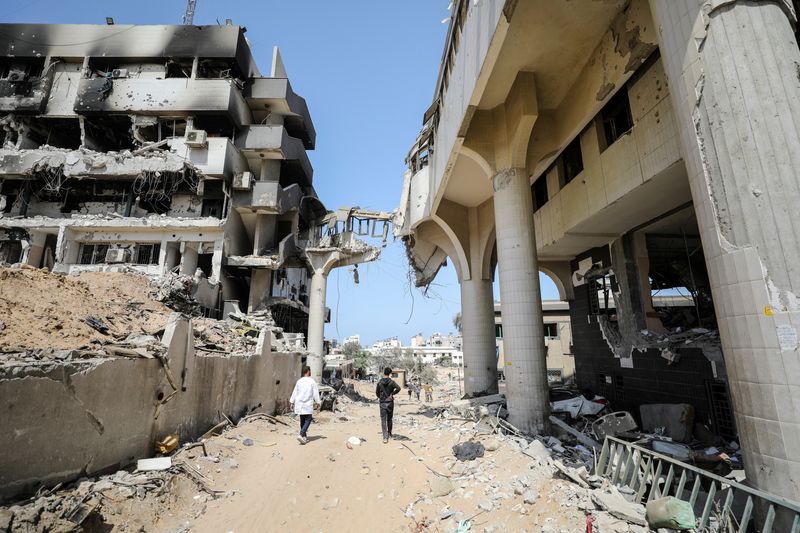By Kate Holton
LONDON (Reuters) -Three former Supreme Court justices have joined more than 600 members of the British legal profession in calling for the government to halt arms sales to Israel, saying it could make Britain complicit in genocide in Gaza.
Their call was also backed by two of the country's leading intelligence experts, who argued that Britain needed to use any leverage it could to persuade Israel, and its biggest backer the United States, to change course in the conflict.
The British government has been a staunch ally of Israel since the eruption of hostilities on Oct. 7 but Foreign Secretary David Cameron has hardened his language in recent months over the humanitarian situation in Gaza.
Cameron said on March 8 that Israel had to be compliant with international humanitarian law in order for Britain to grant export licences allowing arms sales to Israel, and that a judgement on that was underway and due in the "coming days".
The Foreign Office said on Thursday it kept advice on Israel's adherence to the law under review but that the content of government advice was confidential.
Senior members of Britain's legal profession said the government needed to halt sales now to avoid "aiding and assisting an international wrongful act".
"The provision of military assistance and material to Israel may render the UK complicit in genocide as well as serious breaches of International Humanitarian Law," the judges, barristers and legal academics said in a 17-page letter to Prime Minister Rishi Sunak.
One of the former justices, Jonathan Sumption, told BBC Radio he was concerned the British government had lost sight of its own obligations under international law.
Israeli Prime Minister Benjamin Netanyahu has called any suggestion of genocide as "outrageous", and has said Israel has an "unwavering commitment to international law".
RESISTING PRESSURE
Sunak has resisted calls to immediately halt weapons sales to Israel, saying the government adheres to a "very careful licensing regime".
But the killing of seven aid workers, including three British nationals, in Israeli airstrikes this week has ratcheted up the pressure. Israel said they were mistakenly killed.
Britain licenses the sale of British-made explosive devices, assault rifles and components for military aircraft to Israel but it is a relatively small supplier, with Israeli exports making up about 0.4% of Britain's total global defence sales in 2022, the last full-year data was available.
Two senior figures in Britain's intelligence community - former national security adviser Peter Ricketts and Alex Younger, the former head of the MI6 foreign spy service - have said those sales should be used as leverage.
Ricketts said there was "now abundant evidence" that Israel was not compliant with international humanitarian law and that a ban would send a message that could stir debate in Washington.
Younger told the BBC that Britain needed to "achieve leverage, and create incentives for more focus to be put on the issue of what is technically called collateral damage but what we would call as killing innocent civilians".

Earlier this week, Alicia Kearns, the Conservative chair of parliament's foreign affairs select committee, said ministers had been told by their lawyers that Israel had violated international law in its war in Gaza.
The government has in the past blocked sales to Israel, such as in 2009 when it revoked some licences and in 1982 when there was a formal restriction on weapon sales after the invasion of Lebanon.